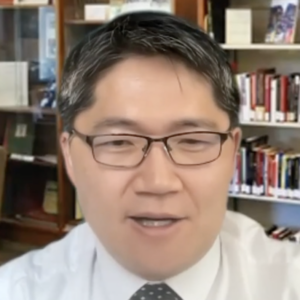Jacob Chengwei Feng is a fellow of Oxford Interfaith Forum, and co-coordinator at Science and Theology group. He is currently a Ph.D. candidate at Fuller Theological Seminary (Pasadena, CA, USA), majoring in Theological Studies. He has been a minister in USA and Singapore since 2009. He was born and raised in China as an atheist. After completing his bachelor’s degree in Engineering Physics from Tsinghua University (Beijing, China), he went abroad to pursue his Ph.D. degree in Physics at Rutgers University (New Jersey, USA), where he became a Christian through the Christians on Campus. After graduating with a master’s degree in Electrical and Computer Engineering, he worked for ten years in the financial institutions on Wall Street (Manhattan, NY, USA). Then, upon God’s calling, he resigned from his job to serve as a full-time pastor in his church. His church affiliation is the Local Church, or the “Little Flock,” founded by Watchman Nee in 1922 in China.
Fuller Theological Seminary
Tsinghua University (Beijing, China)
BE in Engineering Physics
Systematic Theology, Chinese Theology, Theology and Science, Theology and Religion
Alister McGrath and China: Toward a Chinese Theology and Science on Transhumanism for the Third Millennium
2023, Dialog: A Journal of Theology
This paper argues that a Chinese theology of science built on a sympathetic and critical engagement with McGrath’s scientific theology has a rich potential to dialogue with modern sciences and traditional Chinese philosophies and religions on transhumanism. Such constructive theology not only serves as a conversation partner, but also provides a theological critique to the prevalent scientism and humanism in China.
Pneumasis/Pneumafication Based on Romans 8:1–17: Highlighting the Spirit’s Role in Deification
In view of the two key themes found in Romans: pneumatology and deification, some pressing questions can be asked. One of these is, what is the role of the Holy Spirit in deification? This essay identifies one area of the work of the Holy Spirit presented in Romans that is often neglected in New Testament (NT) pneumatology, soteriology, and anthropology. This paper argues that, in Romans 8:1–17, the crucial role of the Spirit, as an active person in the triune Godhead, in possessing and being possessed by believers and facilitating the mutual indwelling of Christ and his co-sufferers, is best captured by a new term, namely, pneumasis or pneumafication. In other words, theosis/deification and Christosis/Christification are made possible by pneumasis/pneumafication.
Holistic Wisdom from a Chinese Perspective: Abrahamic Faiths’ Earliest Encounters with China
Philosophies in the East and West have favored wisdom in their search for truths. The Chinese civilization has sought holistic wisdom in its long history of absorbing the Abrahamic faiths since the seventh century. This paper aims to investigate how the Abrahamic faiths have interacted with ancient Chinese culture. In particular, this paper will examine the earliest written records in Chinese of the Luminous Religion (or Jingjiao), the earliest Jews in Kaifeng, and the earliest Muslims in China. By analyzing their theology of creation with reference to the Holy Spirit and qi (wind/breath/pneuma), this paper attempts a constructive Chinese natural theology based on a sympathetic and critical assessment of Alister McGrath’s natural theology but makes up for his spirit deficit. This paper argues that the holistic wisdom achieved in the early integration process of the Abrahamic faiths with the Chinese culture is closely intertwined with the Spirit and qi, which provides a fruitful ground to construct a Chinese natural theology. The contribution of this paper lies in its original research into the earliest written records of the three Abrahamic faiths in China from the perspective of the doctrine of creation and its relationship with the Spirit and qi.
Addressing the Needham Question from a Theological Perspective: Toward a Chinese Theology of Holistic Wisdom
2022, Zygon: Journal of Religion and Science
Christian theology in general, and Chinese theology in particular, has remained reticent toward the Needham Question originally posed by Joseph Needham in the 1930s. After a brief survey of the Christian response to the theory of evolution introduced into China in 1898, I address the Needham Question from a theological perspective. Then, building on Jürgen Moltmann’s trinitarian proposal, which places science and theology on the common life plane of wisdom, I propose a pneumatological-trinitarian Chinese theology of science by integrating the natural wisdom and the revealed wisdom, the Chinese wisdom and the wisdom of other cultures.
Against the Tide: The Local Churches’ Ecclesiology and Its Contribution to the Glocal Church
2022, Journal of The Evangelical Theological Society
The Local Churches movement has achieved a global presence since its inception in1922. However, it has been much misunderstood, particularly as regards its ecclesiology. En- gaging a hybrid methodology that incorporates contextual, theological, and historical approaches,this study investigates Watchman Nee’s context, presents Nee’s critique of Brethren doctrinesand practices under the influence of colonialism, and discusses Nee’s Trinitarian ecclesiologyand its focus on locality as its ground. An evangelical evaluation of the Local Churches move- ment’s innovative ecclesiology is then offered, concluding that Nee’s missional ecclesiology provesto be a viable solution in the contemporary multi-ethnic and postcolonial world. Next, thestudy engages in dialogue between Nee’s ecclesiology with Veli-Matti Kärkkäinen’s construc- tive ecclesiology, concluding that Nee’s ecclesiology is neither progressive nor primitivist, but glo- cal in scope, missional in nature, and ecumenical in prospect, fostering the glocal interaction be- tween the global and the local church.

